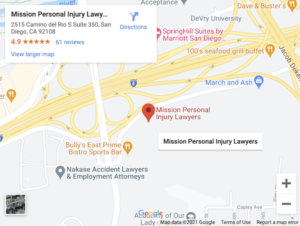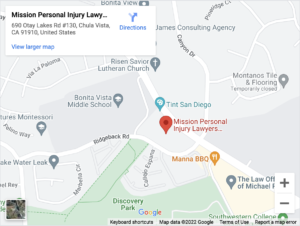
If you are injured in a car wreck, slip and fall, or other accident, you can sue the at-fault party for damages under California tort laws. However, you have a duty to mitigate damages after an accident or injury. Failure to mitigate damages could result in a lower settlement amount for a personal injury claim.
Table of Contents
What is the Duty to Mitigate Damages?
The duty to mitigate requires an injured person to make reasonable efforts to limit the harm they sustain because of another party’s negligence or wrongdoing. Mitigation of damages is the legal doctrine that reduces the amount of money an injured party receives if they fail to take reasonable steps to mitigate their damages.
How Does the Duty to Mitigate Damages Work?
Let’s assume that you slip and fall at a San Diego resort. You are sore, but you do not seek medical care. The soreness worsens, but you do not go to see a doctor for a few weeks after the fall.
The doctor informs you that you need surgery because you sustained a fracture. The doctor says you could have avoided surgery had you sought medical care sooner. The insurance company for the at-fault property owner states that your delay in seeking medical treatment caused your injury to worsen.
Therefore, you should not recover damages related to the surgery or any follow-up care that would not have been required had you sought medical treatment sooner. That includes damages for pain and suffering, lost wages, and medical bills related to the surgery.
Even though the accident was not your fault, you have a duty to mitigate your damages. The rule prevents at-fault parties from being financially liable for damages that were not their fault.
However, the duty to mitigate does not bar you from receiving compensation. It only bars you from receiving compensation for damages you could have avoided. Therefore, it reduces the value of your personal injury claim.
The duty to mitigate does not require you to take extraordinary steps to prevent all damages caused by an accident or injury. You only need to take reasonable steps to mitigate damages. The goal is to act in good faith, which generally means seeking prompt medical care after an accident or injury.
What Should I Do After an Injury or Accident?
Report your injury immediately and seek medical treatment for your injuries. Follow your doctor’s treatment plan, which means keeping your doctor’s appointments, attending physical therapy, taking medication, etc. If you disagree with the treatment plan, seek a second opinion, but don’t ignore medical care.
If your doctor states that you cannot work because of your injuries, ask your doctor to write a statement. The statement should explain your injuries and why they prevent you from working. You need this evidence to help prove a claim for lost wages.
Every damage you claim must have supporting evidence. Therefore, if you claim that you incurred expenses for house cleaning, you need a doctor’s statement explaining how your injuries prevented you from mopping, dusting, washing dishes, doing laundry, or mowing the grass.
Likewise, if you include transportation costs to and from medical appointments, you need detailed mileage reports or copies of receipts for public transportation. If you purchased over-the-counter medications or medical devices, you need copies of the receipts for those purchases.
Keeping detailed records can help you prove that you incurred the expenses. The receipts can also help you prove that you mitigated damages by choosing the store brand for medications instead of the more expensive name-brand items.
Tips for Avoiding Allegations of Failure to Mitigate Damages
Some things that you can do to avoid allegations of failing to mitigate damages include:
- Go to the emergency room after an accident or see a doctor as soon as possible
- Keep all doctor’s appointments
- Following your doctor’s treatment plan
- Seek a timely second opinion if you disagree with your doctor’s assessment
- Stay at home if your doctor tells you not to work
- Return to work as soon as your doctor releases you to do so
- Follow your doctor’s restrictions for activities
- Promptly report any new symptoms or signs of injuries to your doctor
- Take your medications as directed
Your actions are compared to those of a “reasonable” person. First, jurors decide what a person of ordinary prudence would have done given the same circumstances. Then, the jurors compare your actions to those of a “reasonable” person.
If your actions fall short of the reasonable person standard, the jurors might find that you failed to mitigate damages. If so, they may reduce the amount of money you receive for your damages.
Schedule a Free Consultation with a San Diego Personal Injury Lawyer to Discuss Ways to Mitigate Your Damages
If you were injured in an accident, seek medical treatment for your injuries. Then, contact a San Diego personal injury lawyer for a free consultation to assess your personal injury case and explain your legal options for recovering compensation for injuries and damages. A lawyer will provide you with recommendations on mitigating your damages to ensure you recover the maximum amount of money for your claim.


